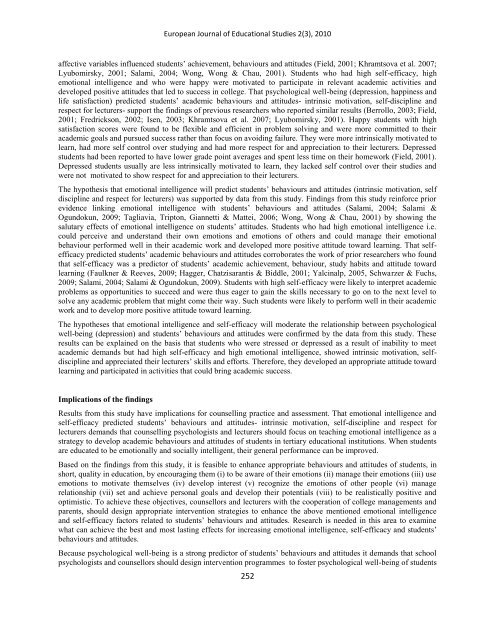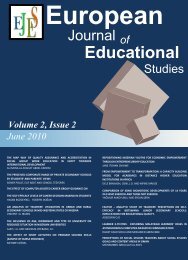emotional intelligence, self-efficacy, psychological well-being and ...
emotional intelligence, self-efficacy, psychological well-being and ...
emotional intelligence, self-efficacy, psychological well-being and ...
You also want an ePaper? Increase the reach of your titles
YUMPU automatically turns print PDFs into web optimized ePapers that Google loves.
European Journal of Educational Studies 2(3), 2010<br />
affective variables influenced students’ achievement, behaviours <strong>and</strong> attitudes (Field, 2001; Khramtsova et al. 2007;<br />
Lyubomirsky, 2001; Salami, 2004; Wong, Wong & Chau, 2001). Students who had high <strong>self</strong>-<strong>efficacy</strong>, high<br />
<strong>emotional</strong> <strong>intelligence</strong> <strong>and</strong> who were happy were motivated to participate in relevant academic activities <strong>and</strong><br />
developed positive attitudes that led to success in college. That <strong>psychological</strong> <strong>well</strong>-<strong>being</strong> (depression, happiness <strong>and</strong><br />
life satisfaction) predicted students’ academic behaviours <strong>and</strong> attitudes- intrinsic motivation, <strong>self</strong>-discipline <strong>and</strong><br />
respect for lecturers- support the findings of previous researchers who reported similar results (Berrollo, 2003; Field,<br />
2001; Fredrickson, 2002; Isen, 2003; Khramtsova et al. 2007; Lyubomirsky, 2001). Happy students with high<br />
satisfaction scores were found to be flexible <strong>and</strong> efficient in problem solving <strong>and</strong> were more committed to their<br />
academic goals <strong>and</strong> pursued success rather than focus on avoiding failure. They were more intrinsically motivated to<br />
learn, had more <strong>self</strong> control over studying <strong>and</strong> had more respect for <strong>and</strong> appreciation to their lecturers. Depressed<br />
students had been reported to have lower grade point averages <strong>and</strong> spent less time on their homework (Field, 2001).<br />
Depressed students usually are less intrinsically motivated to learn, they lacked <strong>self</strong> control over their studies <strong>and</strong><br />
were not motivated to show respect for <strong>and</strong> appreciation to their lecturers.<br />
The hypothesis that <strong>emotional</strong> <strong>intelligence</strong> will predict students’ behaviours <strong>and</strong> attitudes (intrinsic motivation, <strong>self</strong><br />
discipline <strong>and</strong> respect for lecturers) was supported by data from this study. Findings from this study reinforce prior<br />
evidence linking <strong>emotional</strong> <strong>intelligence</strong> with students’ behaviours <strong>and</strong> attitudes (Salami, 2004; Salami &<br />
Ogundokun, 2009; Tagliavia, Tripton, Giannetti & Mattei, 2006; Wong, Wong & Chau, 2001) by showing the<br />
salutary effects of <strong>emotional</strong> <strong>intelligence</strong> on students’ attitudes. Students who had high <strong>emotional</strong> <strong>intelligence</strong> i.e.<br />
could perceive <strong>and</strong> underst<strong>and</strong> their own emotions <strong>and</strong> emotions of others <strong>and</strong> could manage their <strong>emotional</strong><br />
behaviour performed <strong>well</strong> in their academic work <strong>and</strong> developed more positive attitude toward learning. That <strong>self</strong><strong>efficacy</strong><br />
predicted students’ academic behaviours <strong>and</strong> attitudes corroborates the work of prior researchers who found<br />
that <strong>self</strong>-<strong>efficacy</strong> was a predictor of students’ academic achievement, behaviour, study habits <strong>and</strong> attitude toward<br />
learning (Faulkner & Reeves, 2009; Hagger, Chatzisarantis & Biddle, 2001; Yalcinalp, 2005, Schwarzer & Fuchs,<br />
2009; Salami, 2004; Salami & Ogundokun, 2009). Students with high <strong>self</strong>-<strong>efficacy</strong> were likely to interpret academic<br />
problems as opportunities to succeed <strong>and</strong> were thus eager to gain the skills necessary to go on to the next level to<br />
solve any academic problem that might come their way. Such students were likely to perform <strong>well</strong> in their academic<br />
work <strong>and</strong> to develop more positive attitude toward learning.<br />
The hypotheses that <strong>emotional</strong> <strong>intelligence</strong> <strong>and</strong> <strong>self</strong>-<strong>efficacy</strong> will moderate the relationship between <strong>psychological</strong><br />
<strong>well</strong>-<strong>being</strong> (depression) <strong>and</strong> students’ behaviours <strong>and</strong> attitudes were confirmed by the data from this study. These<br />
results can be explained on the basis that students who were stressed or depressed as a result of inability to meet<br />
academic dem<strong>and</strong>s but had high <strong>self</strong>-<strong>efficacy</strong> <strong>and</strong> high <strong>emotional</strong> <strong>intelligence</strong>, showed intrinsic motivation, <strong>self</strong>discipline<br />
<strong>and</strong> appreciated their lecturers’ skills <strong>and</strong> efforts. Therefore, they developed an appropriate attitude toward<br />
learning <strong>and</strong> participated in activities that could bring academic success.<br />
Implications of the findings<br />
Results from this study have implications for counselling practice <strong>and</strong> assessment. That <strong>emotional</strong> <strong>intelligence</strong> <strong>and</strong><br />
<strong>self</strong>-<strong>efficacy</strong> predicted students’ behaviours <strong>and</strong> attitudes- intrinsic motivation, <strong>self</strong>-discipline <strong>and</strong> respect for<br />
lecturers dem<strong>and</strong>s that counselling psychologists <strong>and</strong> lecturers should focus on teaching <strong>emotional</strong> <strong>intelligence</strong> as a<br />
strategy to develop academic behaviours <strong>and</strong> attitudes of students in tertiary educational institutions. When students<br />
are educated to be <strong>emotional</strong>ly <strong>and</strong> socially intelligent, their general performance can be improved.<br />
Based on the findings from this study, it is feasible to enhance appropriate behaviours <strong>and</strong> attitudes of students, in<br />
short, quality in education, by encouraging them (i) to be aware of their emotions (ii) manage their emotions (iii) use<br />
emotions to motivate themselves (iv) develop interest (v) recognize the emotions of other people (vi) manage<br />
relationship (vii) set <strong>and</strong> achieve personal goals <strong>and</strong> develop their potentials (viii) to be realistically positive <strong>and</strong><br />
optimistic. To achieve these objectives, counsellors <strong>and</strong> lecturers with the cooperation of college managements <strong>and</strong><br />
parents, should design appropriate intervention strategies to enhance the above mentioned <strong>emotional</strong> <strong>intelligence</strong><br />
<strong>and</strong> <strong>self</strong>-<strong>efficacy</strong> factors related to students’ behaviours <strong>and</strong> attitudes. Research is needed in this area to examine<br />
what can achieve the best <strong>and</strong> most lasting effects for increasing <strong>emotional</strong> <strong>intelligence</strong>, <strong>self</strong>-<strong>efficacy</strong> <strong>and</strong> students’<br />
behaviours <strong>and</strong> attitudes.<br />
Because <strong>psychological</strong> <strong>well</strong>-<strong>being</strong> is a strong predictor of students’ behaviours <strong>and</strong> attitudes it dem<strong>and</strong>s that school<br />
psychologists <strong>and</strong> counsellors should design intervention programmes to foster <strong>psychological</strong> <strong>well</strong>-<strong>being</strong> of students<br />
252

















